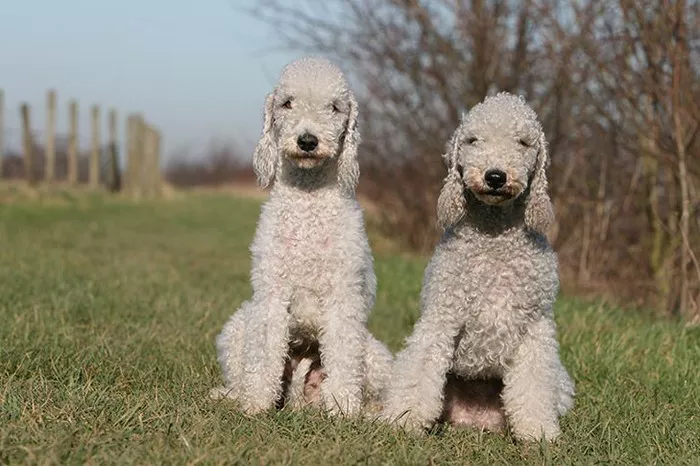The Bedlington Terrier is a unique dog breed known for its lamb-like appearance and energetic personality. Originally bred in England for hunting small game, this breed combines elegance with athleticism. One of the most common questions about Bedlington Terriers is their size. Let’s explore their physical dimensions, growth patterns, and factors that influence their stature.
Physical Characteristics of a Bedlington Terrier
Height and Weight
Bedlington Terriers are small to medium-sized dogs.
Height: Adult Bedlingtons typically stand between 15.5 to 16.5 inches (39 to 42 cm) at the shoulder.
Weight: They usually weigh 17 to 23 pounds (7.7 to 10.4 kg).
Males are slightly larger than females, but the difference is minimal. Their lightweight build allows them to move swiftly, a trait essential for their historical role as hunting dogs.
Body Structure
Their bodies are muscular yet streamlined. Key features include:
- A narrow, arched back.
- Long, slender legs.
- A deep chest for endurance.
- A distinctive “topknot” of curly hair on the head.
This combination gives them a graceful but sturdy appearance.
Growth Stages of a Bedlington Terrier
Puppy Stage (0–12 Months)
Bedlington Terrier puppies grow rapidly.
Birth to 3 months: Puppies weigh 1–3 pounds (0.45–1.36 kg).
4–6 months: Growth slows slightly; they reach 8–12 pounds (3.6–5.4 kg).
7–12 months: They approach adult size but may gain muscle mass.
Owners should provide balanced nutrition during this phase to support bone development.
Adult Stage (1–7 Years)
By age 1, most Bedlingtons reach full height. Weight stabilizes by 18 months. Adults require regular exercise to maintain their lean physique.
Senior Stage (8+ Years)
Older Bedlingtons may lose muscle mass or develop joint issues. Monitoring weight becomes crucial to avoid obesity-related health problems.
Factors Influencing Size
Genetics
Genes play the biggest role in determining a Bedlington’s size. Reputable breeders prioritize healthy lineage to avoid extremes like dwarfism or oversized builds.
Diet
Overfeeding can lead to weight gain, masking their natural athletic shape. High-quality protein and controlled portions are recommended.
Exercise
Daily walks or play sessions help maintain muscle tone. Without activity, they may become overweight despite their energetic nature.
Health Conditions
Certain illnesses, such as hypothyroidism or liver disease, can affect growth. Regular vet checkups ensure early detection of issues.
Comparing Bedlington Terriers to Other Breeds
Similar-Sized Breeds
Whippet: Taller (18–22 inches) but similar weight range.
Miniature Poodle: Comparable height but heavier (10–15 pounds).
Unique Traits
Unlike most terriers, Bedlingtons have a non-shedding, hypoallergenic coat. Their arched back and narrow frame also set them apart from bulkier terrier breeds.
Common Misconceptions About Their Size
“They’re Fragile”
Despite their delicate look, Bedlingtons are tough and agile. Their lean bodies are built for speed and endurance.
“All Bedlingtons Stay Small”
While generally consistent, some may fall outside standard ranges due to genetic variations or crossbreeding.
Caring for a Bedlington Terrier’s Size
Grooming Tips
Their curly coat requires trimming every 6–8 weeks. Proper grooming highlights their slim silhouette.
Exercise Routine
- 30–60 minutes of daily activity.
- Mental stimulation through puzzle toys.
Diet Management
- Avoid free-feeding.
- Use measuring cups for portion control.
Health Considerations Related to Size
Copper Toxicosis
This genetic disorder, common in Bedlingtons, affects liver function and can influence weight. DNA testing helps identify carriers.
Hip Dysplasia
Though rare, improper growth can lead to joint issues. Maintain a healthy weight to reduce strain on hips.
Conclusion
The Bedlington Terrier’s size—15–17 inches tall and 17–23 pounds—makes it a versatile companion for both apartments and active households. By understanding their growth patterns and care needs, owners can ensure these elegant dogs thrive throughout their lives. Whether sprinting in a park or curling up on a couch, the Bedlington’s compact size belies its spirited personality.
Related Topics:
WHAT IS A BEDLINGTON TERRIER CROSSED WITH?
ARE BEDLINGTON TERRIERS CLINGY?
WHY WERE BEDLINGTON TERRIERS BRED?


